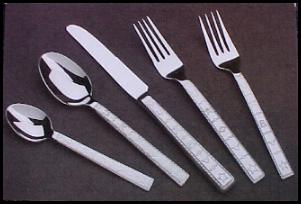 It's easy for servers to get along with the kitchen because the chefs and line cooks respect hard work and interest in food (which ties back in to how a server makes their money. The more you know about food, the more you can impress a table, thus ensuring higher sales and a higher tip average.). What's more complex is the relationships servers have with one another.
It's easy for servers to get along with the kitchen because the chefs and line cooks respect hard work and interest in food (which ties back in to how a server makes their money. The more you know about food, the more you can impress a table, thus ensuring higher sales and a higher tip average.). What's more complex is the relationships servers have with one another.Because restaurants are divided up into sections of a certain number of tables (anywhere from four to seven) where one server is king, servers don't come into very much contact with each other during the course of a normal shift, except during the setup of the restaurant, a lull during service when servers *should* be doing sidework, and during closing-time when late tables linger and servers have nothing to do but wait until it's time to drop the check.
It's interesting how people's opinions can form about one another from these short interactions. I have no idea how my fellow servers behave at their tables, unless I happen to walk by while they're standing there and overhear a snippet of conversation. When one is getting trained to serve in a restaurant, one gets a feeling of how the server who trains you works, but that's pretty minimal. So servers relationships are forged purely on charisma (the type of small talk they make when setting up, standing around, and breaking down the restaurant) and the amount of sidework that is done during a shift.
Sidework is usually every waiter's least favorite aspect of their job. It includes polishing silverware
 and glassware, stocking things like sugar, coffee, and paper for the receipt machine, and folding napkins. It doesn't sound like a lot, but when you are king of your little world for an evening (as is the nature of the server's world), it hurts to have to come back to reality by hauling racks of silverware and glassware out into the bright light of the servers' line and spot-check every piece for leftover food and water spots. A lot of servers avoid sidework for this reason (or maybe it's just because they're lazy), which makes their co-workers hate them. Conversely, someone can be a bad waiter (low sales, mistakes with the kitchen, can't turn their tables fast enough) and if they do enough sidework, their fellow servers will never have a bad word to say about them.
and glassware, stocking things like sugar, coffee, and paper for the receipt machine, and folding napkins. It doesn't sound like a lot, but when you are king of your little world for an evening (as is the nature of the server's world), it hurts to have to come back to reality by hauling racks of silverware and glassware out into the bright light of the servers' line and spot-check every piece for leftover food and water spots. A lot of servers avoid sidework for this reason (or maybe it's just because they're lazy), which makes their co-workers hate them. Conversely, someone can be a bad waiter (low sales, mistakes with the kitchen, can't turn their tables fast enough) and if they do enough sidework, their fellow servers will never have a bad word to say about them.
4 comments:
Love your blog -- it's great to get behind the scenes. The wonderful Danny Aiello film "Dinner Rush" gives a good feel for that dance of a restaurant wait staff, with customers and especially with each other. Keep writing!
Glad to have you back restaurant girl.
Hope those big bucks you are making will keep you shopping!
I work in restaurant too. Except as a busser/ Jr server. It's hard to get along with the real servers. The bussers tend to do most of the "dirty sidework" like re-stocking and stuff.
Post a Comment